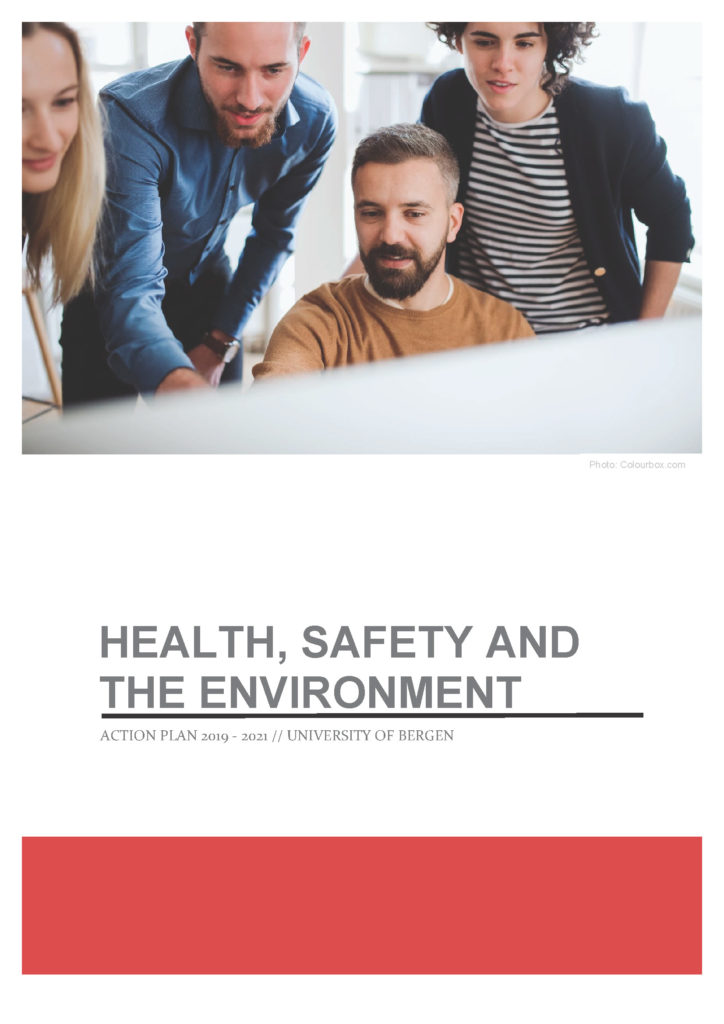 A new Action Plan for Health, Safety and the Environment has just been released, based on UiB’s Strategy 2019-2022 «Knowledge that shapes society.» It is centered around three HSE goals that should characterize UiB: (i) A good working community, (ii) Safe and functional workplaces, and (iii) Good safety culture and emergency preparedness. Maybe this sounds familiar after the HSE-Day on Wednesday? Each HSE goal is a priority area specified through sub-goals for the period 2019 – 2021 and is to be followed up through measures taken at the central UiB level as well as locally through action plans developed at the MN faculty and at our department.
A new Action Plan for Health, Safety and the Environment has just been released, based on UiB’s Strategy 2019-2022 «Knowledge that shapes society.» It is centered around three HSE goals that should characterize UiB: (i) A good working community, (ii) Safe and functional workplaces, and (iii) Good safety culture and emergency preparedness. Maybe this sounds familiar after the HSE-Day on Wednesday? Each HSE goal is a priority area specified through sub-goals for the period 2019 – 2021 and is to be followed up through measures taken at the central UiB level as well as locally through action plans developed at the MN faculty and at our department.
Ugleprisen, the University of Bergen’s annual prize for high quality in education, was yesterday awarded to INF100/101 for Anya Helene Bagge’s efforts to develop a new and student-activizing tool for learning computer programming. Anya is addicted to quality in education — some of you may remember that in 2017 she received the distinction as Lecturer of the Year at our faculty. At that point, she advised her fellow teachers to show that their subject is relevant and useful for the students, and to let them use their knowledge and skills for something they find interesting. 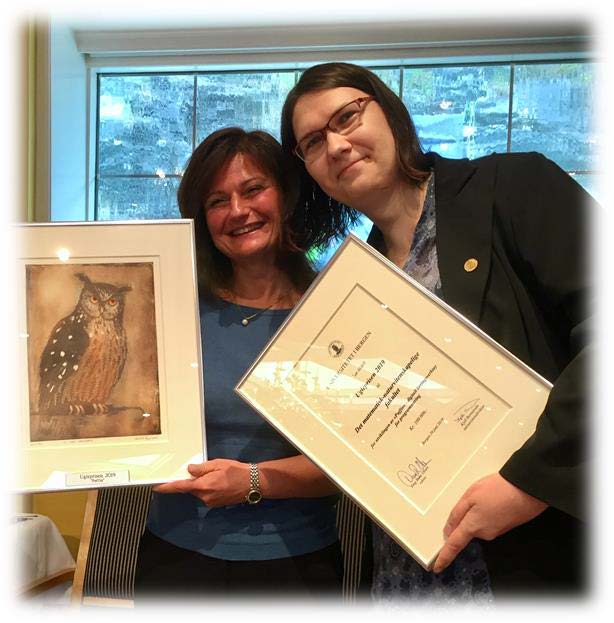 The importance of activating students was emphasized also at the university leadership conference at Solstrand yesterday. Quoting Anya’s boss at the informatics department, «there seems to be a general agreement that regular lectures where the professor talks for 90 minutes are not the way to continue. The same is true for exercise sessions. We have to make sure that the students are actively learning throughout these sessions, and not just passively receiving new material or solutions to exercises. This requires all of us to think in new ways.» These thoughts resonate well with our discussions over educational topics at the HSE-Day last Wednesday.
The importance of activating students was emphasized also at the university leadership conference at Solstrand yesterday. Quoting Anya’s boss at the informatics department, «there seems to be a general agreement that regular lectures where the professor talks for 90 minutes are not the way to continue. The same is true for exercise sessions. We have to make sure that the students are actively learning throughout these sessions, and not just passively receiving new material or solutions to exercises. This requires all of us to think in new ways.» These thoughts resonate well with our discussions over educational topics at the HSE-Day last Wednesday.
We congratulate Anya and the Department of Informatics, and are pleased to note that all freshman students at our faculty will benefit from the good work put into developing INF100 from the fall of 2020, as part of the phasing-in of transferable skills in all programs!
 Thibault Tubiana is a new postdoctoral fellow working with Nathalie Reuter on the FreMedBio-funded PePrMInt project. During his PhD at the French Atomic Energy Commission (CEA – Paris Saclay), he studied the norovirus capsid self-assembly using molecular dynamics, homology modelling, protein/protein docking but also some experiments with Small Angle X-ray Scattering (SAXS). During his PhD years, he taught in the Bioinformatics Master of the University of Paris Diderot (Paris VII), mainly in Python, Unix, Biostatistics and molecular visualization software. The present appointment is his second postdoc position; the first one was at a pharmaceutical company near Paris.
Thibault Tubiana is a new postdoctoral fellow working with Nathalie Reuter on the FreMedBio-funded PePrMInt project. During his PhD at the French Atomic Energy Commission (CEA – Paris Saclay), he studied the norovirus capsid self-assembly using molecular dynamics, homology modelling, protein/protein docking but also some experiments with Small Angle X-ray Scattering (SAXS). During his PhD years, he taught in the Bioinformatics Master of the University of Paris Diderot (Paris VII), mainly in Python, Unix, Biostatistics and molecular visualization software. The present appointment is his second postdoc position; the first one was at a pharmaceutical company near Paris.
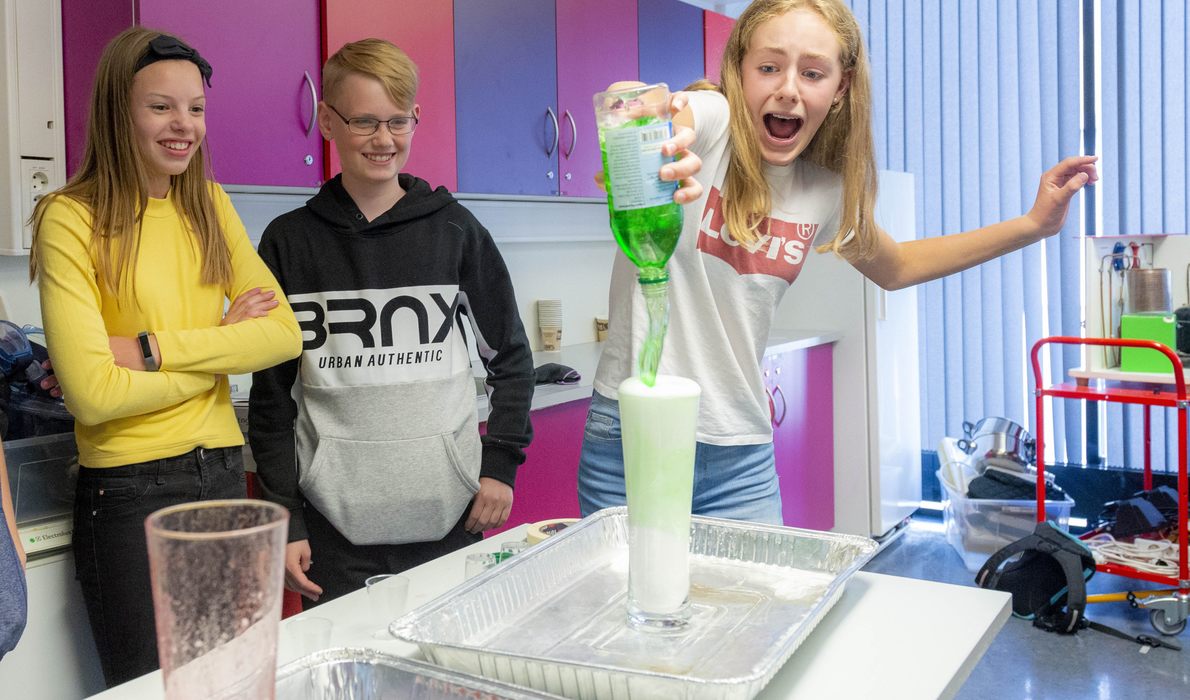
In week 26 and 27 (June 24 — July 4),
VilVite will be using our two course laboratories at the 4th floor for the
SommerViten program. SommerViten is directed at pupils at levels 7 to 10, i.e. the last four levels in the public school system.
Monday to Thursday these weeks, about 40 youngsters will be present in these two labs from 9.30 to 15.00. If you should meet any of them straying off the narrow path, please help them back to the labs at the 4th floor!


I would like to thank everybody for their pleasant company and valuable contributions and suggestions during the HSE event yesterday! Special thanks go to Kristin, Lisbeth and Reidun for taking part in planning the event, and to Svein for his many good suggestions for group tasks!
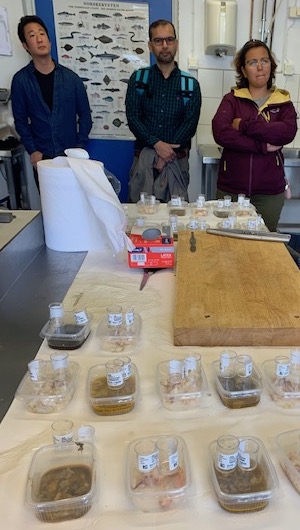
Each and one of us will be going on and off vacation at different dates during the next one-and-a-half months. Hope that you all get a nice and well-deserved summer vacation, with even more of the lovely sun we had on the pier and better-looking crab than we saw at IMR.
As mentioned at TCLS today, there is a full-day seminar on the role of UiB in NORA, the Norwegian Artificial Intelligence Research Consortium tomorrow Friday June 21, taking place in the Large auditorium, 2nd floor Datablokken, Høyteknologisenteret.
10:00 Welcome and background for the meeting: Pinar Heggernes, Dept. head of informatics, and chair of the board of NORA
10:15 Presentation of NORA, with questions and discussion: Klas Pettersen, director of NORA
10:45-12:00 and 13:00:14:00: Presentation of AI and ML related research at UiB
Although the MSc ceremony has already been held, reality is that quite a few of the master exams at the department come up the next couple of weeks. Each master exam starts by the candidate giving a presentation of the research project. This presentation is open to the public and you are encouraged to attend and thus to contribute to creating a nice framework for the event. You have a lot of interesting topics to choose from: 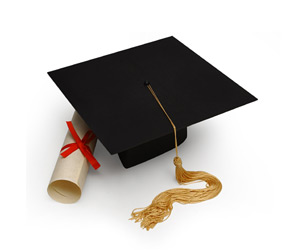 (Date time @ Room: Candidate: Thesis title)
(Date time @ Room: Candidate: Thesis title)
June 21 09h15 @ 2018: Lena Helvik – A study in environmental chemistry: natural and anthropogenic radionuclides in sediment cores from the Norwegian Trench and the Vefsnfjord
June 24 10h15 @ Tripletten: Tora Skarvatun – Synthetic studies toward substrates and inhibitors for N-terminal acetyltransferases
June 17 9h00 @ 2018: Ingrid Trydal Rønsberg – New insights on equilibrium forms of anthocyanins – Complete characterization of hemiketal forms of pigments isolated from grape skins
June 17 14h15 @ 2018: Mohammed Zakarya Alhaji – An Experimental Study of Bulk Foam Properties with Commercial Surfactants in Saline Environments
June 18 10h00 @ Tripletten: Carina Yeeka Wu – Antisolvent precipitation method to synthesize nanoparticles of psychotropic drugs
June 18 10h15 @ Grupperom 6: Nina Marselie Nilsen – Kartlegging av metoder innen høyfelts MRI og NMR-spektroskopi for bestemmelse av fuktegenskaper i porøse medium
June 18 11h00 @ 2018: Gunhild Haustveit – pH indikatorar: Inkorporering av pH-indikatorar i porøse silikastrukturar, som er syntetisert direkte på substrat, og hydrogelar med pH-avhengig ekspansjon
June 20 08h15 @ Tripletten: Øyvind Brandtzæg – Multivariat analyse av CO2-absorbsjon ved bruk av ulike aminblandingsforhold
June 20 10h15 @ 2018: Simen Prang Følkner – Synthesis and Characterization of Metal Oxide-Supported Nanoparticles for Hydrodeoxygenation of Phenols and Phenyl Ethers
June 20 11h00 @ Reagensglaset: Ann Kristin Danielsen Jacobsen – Hvordan løser elever i videregående skole beregningsoppgaver i kjemi? En kvalitativ studie av elevers prøvebesvarelser og oppgavebaserte intervjuer
June 20 11h15 @ Tripletten: Merethe Birkeland – A Study of Salmon Pituitary Tissue using Magic Angle Spinning 1H-NMR
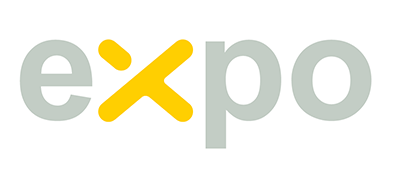 EXPO2019 is a big happening running all day (until 4 pm) at Campus Kronstad, where all the new engineers present their bachelor and master projects through creative stands. This is a great opportunity for insight into the research activities at the Faculty of Engineering and Science at the Western Norway University of Applied Science (aka Høgskulen på Vestlandet). A number of the chemistry projects hold an impressive level of quality — hope to see many of the new engineers as MSc students at our department when the new semester starts up!
EXPO2019 is a big happening running all day (until 4 pm) at Campus Kronstad, where all the new engineers present their bachelor and master projects through creative stands. This is a great opportunity for insight into the research activities at the Faculty of Engineering and Science at the Western Norway University of Applied Science (aka Høgskulen på Vestlandet). A number of the chemistry projects hold an impressive level of quality — hope to see many of the new engineers as MSc students at our department when the new semester starts up!

Great effort to device a new synthetic route for bexarotene

These guys have constructed the rig behind them and designed and programmed a system for gauging the level of filling of the liquid tank.

Photo: Thor Brødreskift
Last Thursday the MN faculty celebrated the BSc and MSc candidates that are graduating this spring. Both events offered insightful speeches and beautiful trumpet music (including Triumphal March from Aida!)
The BSc ceremony was a first, and it was great to welcome 12 BSc candidates from chemistry on stage — Good job! Next year all programs will surely have a strong presence.

Photo: Thor Brødreskift
The University Aula was completely crammed during the MSc ceremony. In only few years this event has become a must for both graduates and their guests. It makes a very nice frame around the completion of a Master’s education in Science!
Emile S. Berg very recently started his PhD study at the chemistry department. The project will be conducted in close collaboration with Haukeland University hospital (HUS) and includes investigating diffusion MRS sequences for two different nuclei and in functional magnetic resonance imaging (fMRI).  The PhD runs over 4 years with main supervisor Assoc. Prof. John Georg Seland and co-supervisor Assoc. Prof. Eli Renate Grüner. Emile holds BSc and MSc degrees in Physics from UiB. His master project demonstrated the effects of a new post-processing technique in diffusion imaging called free water elimination. He also spent some time working at HUS testing different machine learning and deep learning techniques in the classification of fMRI data.
The PhD runs over 4 years with main supervisor Assoc. Prof. John Georg Seland and co-supervisor Assoc. Prof. Eli Renate Grüner. Emile holds BSc and MSc degrees in Physics from UiB. His master project demonstrated the effects of a new post-processing technique in diffusion imaging called free water elimination. He also spent some time working at HUS testing different machine learning and deep learning techniques in the classification of fMRI data.
 A new Action Plan for Health, Safety and the Environment has just been released, based on UiB’s Strategy 2019-2022 «Knowledge that shapes society.» It is centered around three HSE goals that should characterize UiB: (i) A good working community, (ii) Safe and functional workplaces, and (iii) Good safety culture and emergency preparedness. Maybe this sounds familiar after the HSE-Day on Wednesday? Each HSE goal is a priority area specified through sub-goals for the period 2019 – 2021 and is to be followed up through measures taken at the central UiB level as well as locally through action plans developed at the MN faculty and at our department.
A new Action Plan for Health, Safety and the Environment has just been released, based on UiB’s Strategy 2019-2022 «Knowledge that shapes society.» It is centered around three HSE goals that should characterize UiB: (i) A good working community, (ii) Safe and functional workplaces, and (iii) Good safety culture and emergency preparedness. Maybe this sounds familiar after the HSE-Day on Wednesday? Each HSE goal is a priority area specified through sub-goals for the period 2019 – 2021 and is to be followed up through measures taken at the central UiB level as well as locally through action plans developed at the MN faculty and at our department. The importance of activating students was emphasized also at the university leadership conference at Solstrand yesterday.
The importance of activating students was emphasized also at the university leadership conference at Solstrand yesterday.  Thibault Tubiana is a new postdoctoral fellow working with Nathalie Reuter on the FreMedBio-funded PePrMInt project. During his PhD at the French Atomic Energy Commission (CEA – Paris Saclay), he studied the norovirus capsid self-assembly using molecular dynamics, homology modelling, protein/protein docking but also some experiments with Small Angle X-ray Scattering (SAXS). During his PhD years, he taught in the Bioinformatics Master of the University of Paris Diderot (Paris VII), mainly in Python, Unix, Biostatistics and molecular visualization software. The present appointment is his second postdoc position; the first one was at a pharmaceutical company near Paris.
Thibault Tubiana is a new postdoctoral fellow working with Nathalie Reuter on the FreMedBio-funded PePrMInt project. During his PhD at the French Atomic Energy Commission (CEA – Paris Saclay), he studied the norovirus capsid self-assembly using molecular dynamics, homology modelling, protein/protein docking but also some experiments with Small Angle X-ray Scattering (SAXS). During his PhD years, he taught in the Bioinformatics Master of the University of Paris Diderot (Paris VII), mainly in Python, Unix, Biostatistics and molecular visualization software. The present appointment is his second postdoc position; the first one was at a pharmaceutical company near Paris. In week 26 and 27 (June 24 — July 4),
In week 26 and 27 (June 24 — July 4), 


 (Date time @ Room: Candidate: Thesis title)
(Date time @ Room: Candidate: Thesis title)




 The PhD runs over 4 years with main supervisor Assoc. Prof. John Georg Seland and co-supervisor Assoc. Prof. Eli Renate Grüner. Emile holds BSc and MSc degrees in Physics from UiB. His master project demonstrated the effects of a new post-processing technique in diffusion imaging called free water elimination. He also spent some time working at HUS testing different machine learning and deep learning techniques in the classification of fMRI data.
The PhD runs over 4 years with main supervisor Assoc. Prof. John Georg Seland and co-supervisor Assoc. Prof. Eli Renate Grüner. Emile holds BSc and MSc degrees in Physics from UiB. His master project demonstrated the effects of a new post-processing technique in diffusion imaging called free water elimination. He also spent some time working at HUS testing different machine learning and deep learning techniques in the classification of fMRI data.